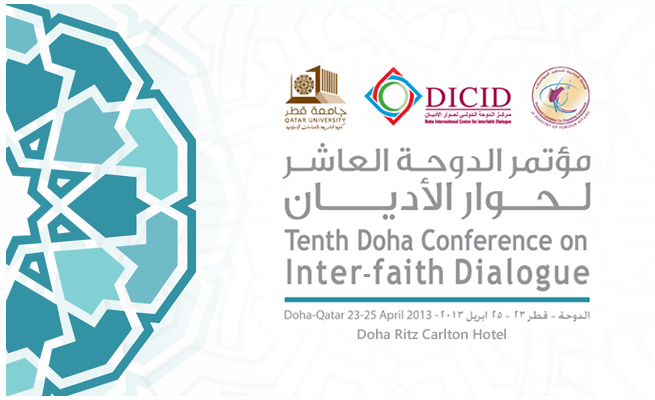Declaration of the Tenth Doha Conference for Inter-faith Dialogue
April 25, 2013
We, the 300 participants from over 70 countries on six continents – Jews, Christians, Muslims among other religions – met at the Doha Ritz Carlton for the Tenth Doha Interfaith Conference from April 23 to 25, 2013. We acknowledge the generous hospitality of HH Shaikh Hamad Bin Khalifa Al-Thani and of the State and people of Qatar, and pay tribute to the organizers of the conference, the Doha International Center for Interfaith Dialogue (DICID), the Ministry of Foreign Affairs and Qatar University.
In the augural session chaired by Dr. Aisha al-Mannai, Dr. Ibrahim al-Naimi, Chairman, DICID and the Minister of Justice, HE Mr. Hassan Bin Abdulla Al-Ghanim welcomed the participants and spoke for the need to make and to follow up concrete recommendations in the theme of the conference entitled 'Best Practices in Interfaith Dialogue'.
On the occasion of tenth anniversary of the Doha Interfaith Conference, the Center decided to award the Doha International Award for Interfaith Dialogue 2013. Out of the over 150 applications from individuals and organizations from every corner of the world, the award was granted to Dr. Muhammad al-Sammak while three individuals and three organizations were also honoured for their excellence and contribution to interfaith dialogue. In a special session after the inauguration, all the award winners hailing from Lebanon, Bosnia, United States, Morocco, Canada and Turkey shared their experiences with the participants.
The Conference addressed four main themes:
1 - Academic
2 - Justice
3 - Conflict Resolution and Peace
4 - Media Culture
Academic
Justice
Conflict Resolution and Peace
All reports called for interfaith communities to continue cooperating constructively to find common ground in the creation of just societies through capacity building of religious and civic leaders for inspiring responsible male and female leadership. This can lead not only towards resolving conflicts in their own communities, but also towards rising above narrow tribal interests and contributing to resolving conflicts of other communities as well. This may bring pressure on decision makers on all sides of any conflict. Religious leadership should also heal communities that have been hurt due to conflict by counseling forgiveness, reconciliation and psychological healing after conflicts.
Media Culture
With the penetration of media into our everyday lives, especially over the past decade, the power of harnessing personal stories in the public sphere has become increasingly important for promoting symbiotic coexistence in modern societies. One should recognize the usefulness of some technological tools when they are integrated into school teaching for raising interfaith sensibility and presenting a fair, truthful and attractive image of religions.
In response to Mr. Rashad Hussein, President Obama's special envoy for the Organization of Islamic Cooperation (OIC), there was an important announcement made by Dr. Aisha al-Mannai on behalf of DICID, about the invitation from OIC to organize a follow-up meeting on UN Human Rights resolution 16/18. DICID hopes to host this meeting in the near future on the theme of "The protection of religious communities and their sacred symbols".
DICID would also like to celebrate its continuing collaboration with its long term partner the Woolf Institute of Cambridge, United Kingdom. This year DICID we are launching a joint website promoting effective and sustainable interfaith activity. The website is called ESID.
We urge the world community to denounce strongly any form of violence and persecution against religious scholars and leaders. The conference notes with great concern the ongoing violence against civilians and places of worship in Syria especially the abduction of Metropolitan Boulos Yazigi and Metropolitan Yohanna Ibrahim both of whom had intended to take part in this conference and who have made such important contributions to interfaith dialogue in the region and beyond.
10 th Doha Conference for Interfaith Dialogue
From 23-25 April 2013 Doha- Qatar





